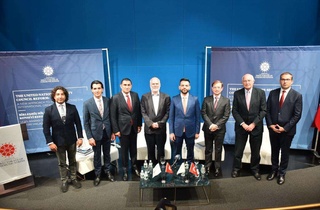The panel, organized in the Türkevi Centre, where the Turkish Consulate General in New York and the Permanent Mission of Türkiye to the UN are located, and moderated by Associate Professor Kılıç Buğra Kanat, Foundation for Political, Economic, and Social Research (SETA) Washington DC Research Director, attracted the interest of Turkish and American experts along with the invitees.
The UN Director of the International Crisis Group, Richard Gowan, evaluated the current performance of the UN Security Council during the first session of the panel under the title “Is it a relic from the past or is it still relevant?”
Noting that Russia's war in Ukraine has again raised questions at the global level about the council's weakness, Gowan stated, “The Security Council has failed to respond to Russia's aggression in a meaningful manner as expected.”
“This demonstrates that none of the five permanent members of the council has a vested interest in pursuing radical reforms,” Gowan said, adding that the council has been able to maintain a limited level of functionality in other areas despite the ongoing debate over the war in Ukraine.
Francisco Gutierrez, the Undersecretary of Colombia's Permanent Representative to the UN, pointed out that the situation of the council should be understood not only in terms of security concerns but also in terms of procedure.
Gutierrez said: “I agree with the view that Security Council reform is an inevitable process. I would like to emphasize the need for organizations to reconsider not only the necessary adjustments in completing themselves but also the renewal of their powers on international security in order to effectively ensure the current conditions.”
Former Special Representative of the Secretary-General and head of the UN Support Mission in Libya (UNSMIL), Ian Martin, stated that the veto right of permanent members was one of the most problematic issues in the Security Council and that he supported the proposal to limit vetoes and hold members with veto rights accountable to the General Assembly.
Martin said: “However, I highly doubt that a permanent member of the Security Council would stop, under any circumstances, the actual use of the veto.”
“The question is no longer whether reform is necessary, but rather how it will be implemented”
In the second session of the panel moderated by Oğuz Güner, Head of the Public Diplomacy Department of the Directorate of Communications, reform proposals for the UN Security Council were discussed under the title, “Does it serve its function? Is there a more suitable format?”
Director of the Kent Global Leadership Program at Columbia University, Jean-Marie Guehenno, remarked that the necessity of reforming the United Nations Security Council was evidently convincing to everyone who attended the first session of the panel and said: “I commend the Presidency of the Republic of Türkiye for launching this initiative. The question is no longer whether reform is necessary, but rather how it will be implemented.”
Guehenno noted that the Security Council had been incapable of addressing the atrocities in Syria and Ukraine, adding: “Despite how dysfunctional it is, the Security Council demonstrates, on occasion, that its decisions can still have an effect. However, this is in no way satisfactory for the people who are currently dying in Ukraine, Yemen, and other countries. We can and should do better.”
Guehenno stated that he believes Türkiye is an influential nation that is well-positioned to mobilize other nations, adding: “A predictable world is preferable to an unpredictable, lawless one, even for the strongest.”
Associate Professor Şuay Nilhan Açıkalın from the Faculty of Economics and Administrative Sciences of Ankara Hacı Bayram Veli University recalled that the restructuring of the UN Security Council was a topic of debate since the 1990s and said: “The council is ineffective in reacting to global problems. All traditional paradigms have clearly changed now more than ever, and we are facing more hybrid, more interconnected, more versatile problems.”
Açıkalın continued her speech, stating: “And these are not just regional or national problems, but global problems involving violence in different continents and areas, which are humanity's biggest problem. However, the problem is not only the violence itself but also the silence of the countries in the UN Security Council in response to it. Therefore, let us be meticulous in determining how we can change the UN Security Council or how we can achieve greater justice or equal representation in the UN Security Council.”
Professor Vesselin Popovski from the International Peace Studies at Soka University in Japan thanked the organiser for the project and workshops on Security Council reform and said: “Let me say that with your diplomatic experience, there is no country better than Türkiye to do this.”
Popovski stated that the authority vested in the UN Charter for the permanent members to approve the changes was a significant obstacle; therefore, reform efforts were met with a great deal of scepticism and pessimism.
Popovski stated that the primary obstacle was that the permanent members of the council did not wish to give up their veto power and added: “People are trying to underestimate it. But if we ask the people of Syria, Yemen, the Rohingya people in Myanmar, or the Ukrainians, the veto is the sole cause of what happened to them. More than a million people have lost their lives in the last ten years.”
The panelists were given gifts, and souvenir photographs were taken at the conclusion of the programme. (ILKHA)



 Dünya
Dünya
 Dünya
Dünya
 Dünya
Dünya
 Güncel
Güncel
 Güncel
Güncel
 Güncel
Güncel
 Güncel
Güncel
 Dünya
Dünya
 Dünya
Dünya
 Dünya
Dünya





